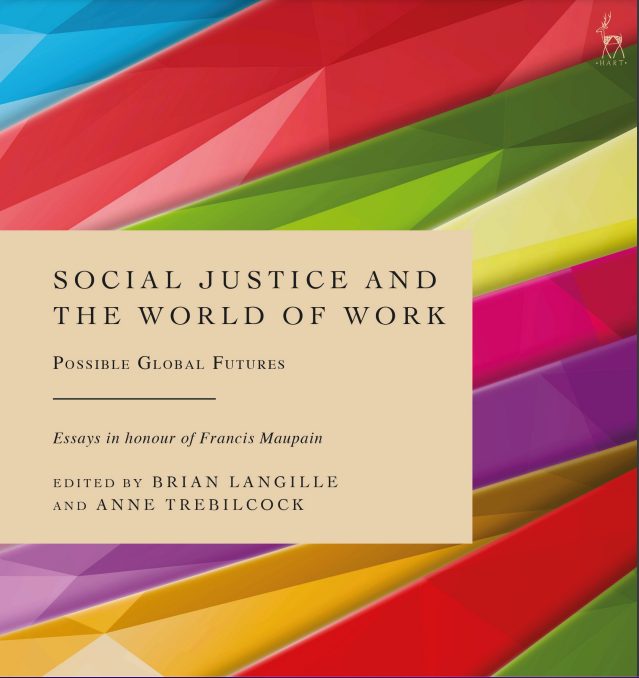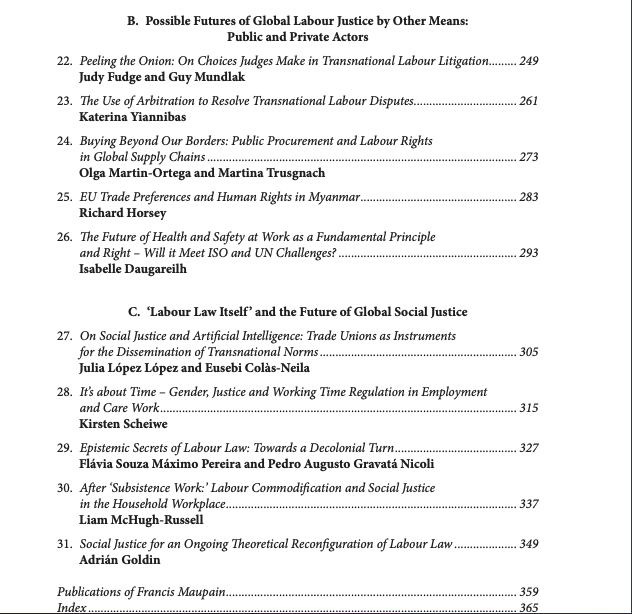Excited to teach my new #internationallaborlaw course critically considering how labor rights are designed & enforced. The class balances decolonial theory w/ practical experiences. My syllabus (with names redacted) below. 1/ 

We begin w/ an overview of int’l labor rights & the @ILO, including by situating it within global independence efforts & decolonial struggles. We learn how the ILO’s unique structure, made up b/w state & non-state actors, contributed to its system of labor standards. 2/ 

We shift to the ILO’s fundamental rights, beginning w/ its “enabling rights” of freedom of association & collective bargaining. We learn about how the instruments create universal rights but are, in many aspects, open and subject to interpretation. That was deliberate. 3/ 

We will speak with the ILO’s branch Chief about how that universality & flexibility is necessary to ensure that all states – irrespective of economy, political ideology, or cultural norms – can participate in a global system that strives to give workers agency. 4/ 

We then turn to the rest of the ILO’s fundamental conventions, beginning with prohibitions against child labor. We will speak with representatives of the @ILO and the US gov’t to hear more about how those instruments play out in practice. 5/ 

We will then learn about the ILO’s forced labor conventions. I haven’t added it yet, but plan to include this Xinjiang forced labor report xinjiangsanctions.info/wp-content/upl…. 6/ 

Next, we turn to the @ilo's brand new fundamental labor right – occupational safety and health. We will hear from a leading advocate about how the ILO’s members decided to elevate the status of this right, and how those negotiations played out on the ILO’s floor. 7/ 

We then turn to the ILO’s elimination of discrimination rights. I plan to ask the @ilo abt how they address sexual identity & the non-binary, as well as the ILO’s new instrument prohibiting violence & harassment at work. This concludes the ILO’s fundamental rights. 8/ 

The class then explores how #IFIs such as the @WorldBank have treated international labor rights in their development programs. They will read critical development literature & will hear from a senior Bank expert on its gender rights programs. 

The class then pivots to the vulnerable workers who have been left out of int’l legal protections, beginning w/ LGBQT+ workers. We will compare how those wrkers are (or not) protected under the ILO’s instruments with their protections under other UN instruments, namely CEDAW. 10/ 

Lance Compa will then will us through his great work advocating for migrant and women workers, and how US laws and practices often leave these sectors of vulnerable workers without sufficient legal protections. 11/ 

Next, we turn to transnational workers. We begin with workers very close to my ❤️– seafarers. We will learn about the ILO’s Maritime Labor Convention, before turning to how governments try to protect transnational workers through trade. 

The class concludes by looking @ public/private initiatives under due diligence programs. We will learn about recent initiatives in the EU to pass binding legislation & will hear from leading corporate due diligence experts on how these requirements play out in practice. 13/ 

The point of the class is to show how international labor rights were designed as the means & ends to protecting vulnerable workers but have been used for many different purposes. I hope to inspire more deliberate & critical thinking about how rights can be protected. End/
• • •
Missing some Tweet in this thread? You can try to
force a refresh











